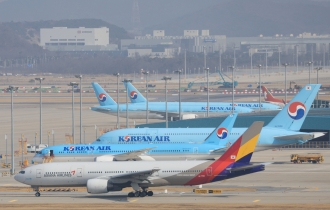Korean investors risk losing W127b on crashing German bond yields
Germany’s 10-year bond yields are discovering new lows amid signs of a global recession. This, in turn, is hurting South Korean investors who bought the structured products tied to the German bond performance.
The investors, comprised of mostly high net-worth individuals and corporate investors, are facing the risk of losing 126.6 billion won ($104.5 million) worth investments as of Aug. 19.
Korea’s financial watchdog has pledged to probe the situation and look into glitches in internal control of the financial institutions, including Woori Bank, that sold such products.

A pedestrian walks past automated teller machines of KEB Hana Bank and Woori Bank on Aug. 19. The banks are two largest financial institutions that had sold funds into securities linked to foreign derivatives, according to an estimate by the Financial Supervisory Service.
Yonhap
The debacle looms as the structured products are due to mature by September-November this year.
Details in the term sheet might differ, but the gist of the product is those investing in the fund that buys securities linked to the performance of 10-year bond yield will be guaranteed an annual 2-4 percent return, unless the yield dips to below minus 0.2 percent.
Once the bond yield drifts lower than minus 0.2 percent, the products will lead to investor losses of 2-3 percent for every 1 basis point drop of German 10-year bond yield.
Now that German 10-year bond yield has recently breached minus 0.7 percent mark, concerns are rising as the degree of the losses might reach 100 percent of the total investment if this downtrend continues until maturity. As of Aug. 7, the investors in German bond yield-linked securities took an average 95.1 percent loss, according to the Financial Supervisory Service.
The news is sparking investor ire, as they claim they were not properly notified of the risks. The brokerages and funds that invested in such securities were sold through the sales channels of Woori Bank and NH Investment & Securities, according to the FSS data. Woori Bank takes up over 99 percent of the entire sales.
FSS said on Aug. 19 that it had received 29 complaints about the financial institutions’ alleged misconduct as of Aug. 16. It said the cases are subject to arbitration by the financial authorities.
This is part of some 822.40 billion won investment into such structured products linked to overseas derivatives, according to FSS. The funding was raised through Woori Bank, KEB Hana Bank, KB Kookmin Bank, Yuanta Securities Korea, Mirae Asset Daewoo and NH Investment & Securities.
The rest of the investments, other than German bond yield-related DLS, made their way into instruments tied to both US dollar 5-year constant maturity swap rate and UK pound 7-year CMS rate. Their assets are on average 56.2 percent lower than the initial value as of August, while the majority of the products’ maturity date is due in 2020.
These come as a result of the US’ two- to 10-year Treasury yield curve inversion for the first time since 2007 -- a closely-watched signal recognized as an omen for global recession.
By Son Ji-hyoung (consnow@heraldcorp.com)
EDITOR'S PICKS
- Seoul shares rattled by Israeli attack on Iran; Kospi dips to nearly 11-week low
- S-Oil donates W560m to support firefighters
- LG CNS teams up with Yonsei University to nurture AI specialists
- Polestar 4 to make Korean debut in June
- S. Korea pledges W23tr venture capital fund for green investment at G20 meeting
- Sungsimdang outperforms bakery giants to log sales over W100b
- France rejects opening Paris flight routes to T'way Air, deals blow to Korean Air merger
- SK hynix chief underscores chip cooperation between Korea, US















